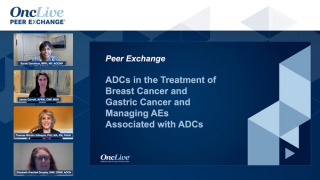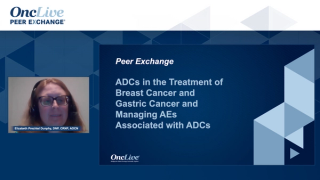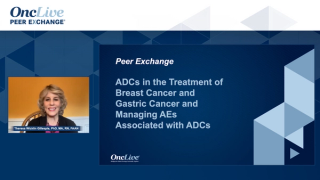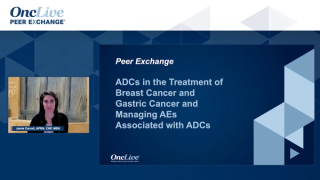
Breast Cancer
Latest News
Latest Videos

More News

Patients with triple-negative breast cancer with an increased TIL count in breast tissue were more likely to have an improved distant recurrence-free survival.

The final breast cancer screening recommendation from the United States Preventive Services Task Force advises that women aged 40 should begin biennial screening.

Trastuzumab deruxtecan enhanced survival without disease progression compared with chemotherapy in HR-positive, HER2-low metastatic breast cancer after 1 or more lines of endocrine therapy.

From journaling to delegating everyday tasks, nurses can teach patients how to cope with treatment-related fatigue.

Trastuzumab-strf was approved for HER2-overexpressing breast cancer and HER2-overexpressing metastatic gastric or GEJ adenocarcinoma.

A pilot study proved that a nurse-coordinated approach shows promise in treating more than just 1 symptom among patients with cancer.

Tools to educate oncology nurses and patients on the use of Mepitel film to prevent radiation dermatitis has improved the workflow around its introduction to patients with breast cancer, as well as its application and maintenance.

Older patients with cancer demonstrated a moderate to high symptom burden, leading to the need for routine symptom assessments and tailored management interventions.

Patients with BRCA wild-type triple-negative breast cancer treated with olaparib on a gap schedule with chemotherapy did not experience improved responses compared with chemotherapy alone in the neoadjuvant setting.

Sarah Montini, BSN, RN, OCN, provides an in-depth look at abemaciclib for the treatment of patients with breast cancer in a downloadable reference sheet.

The optical imaging agent Lumisight and the Lumicell Direct Visualization System received approval from the FDA for fluorescence imaging in breast cancer.

Breast-conserving therapy following preoperative systemic therapy resulted in superior overall survival compared with mastectomy in patients with HER2-positive breast cancer.

The FDA granted accelerated approval to fam-trastuzumab deruxtecan-nxki (Enhertu) for patients with unresectable or metastatic HER2-positive solid tumors who have received prior systemic treatment.

The biologics license application for datopotamab deruxtecan has been accepted by the FDA for pretreated HR-positive, HER2-negative metastatic breast cancer.

Patients with early-stage breast cancer treated with ribociclib plus a nonsteroidal aromatase inhibitor provided a greater invasive disease-free survival benefit compared with nonsteroidal aromatase inhibitor therapy alone.

The safety label for fluorouracil products will now include information about the agent’s use in patients with dihydropyrimidine dehydrogenase deficiency.

With the progress made with ADCs, there is interest in moving these agents up in the treatment paradigm for HR-positive/HER2-negative breast cancer.

In a 16-to-2 vote, the FDA's Medical Imaging Drugs Advisory Committee voted in support of the benefit-risk profile of Lumisight to detect cancerous tissue during breast conservation surgery.

Cancer teams, including oncology nurses, can make conscious choices to potentially alleviate the disparities that persist in hypofractionation, toxicity, and cardiac doses in radiotherapy for Black and Asian patients with breast cancer.

Treatment-emergent symptoms were easily resolved after treatment with olaparib for BRCA1/2 high-risk HER2-negative breast cancer, as shown in a patient reported outcome analysis of the phase 3 OlympiA trial.

A treatment for NTRK-positive locally advanced or metastatic solid tumors, repotrectinib, is currently under priority review by the FDA and may address a high unmet medical need.

Although breast cancer has historically been associated with female patients, the rates of men with breast cancer have been increasing over the past decade.

Fast track designation has been granted by the FDA to vepdegestrant for the treatment of select patients with ER-positive/HER2-negative locally advanced or metastatic breast cancer.

With a new approval for elacestrant, patients with ER+/HER2–, ESR1-mutated metastatic breast cancer have an oral alternative to fulvestrant.

A recent study found that a 2.5-mg dose of olanzapine was noninferior to the 10.0-mg dose to control nausea/vomiting in patients with solid tumors treated with chemotherapy and was able to reduce daytime drowsiness from the drug.


































































































